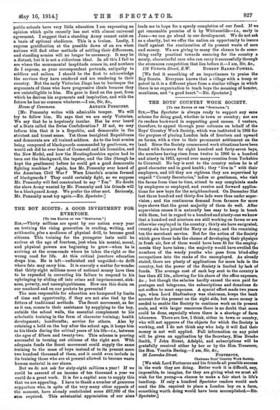THE BOY SCOUTS: A GOOD INVESTMENT FOR EVERYONE.
[To THE EDITOH or THE " SFECTATOH.".1
SiE,—Thirty millions are spent by our nation every year on training the rising generation in reading, writing, and arithmetic, plus a modicum of physical drill, to become good citizens. This training for the youngster lasts until he arrives at the age of fourteen, just when his mental, moral, and physical powers are beginning to grow—when he is arriving at the cross-roads where be takes the right or the wrong road for life. At this critical juncture education drops him. He is left—unfinished and unguided—to drift where fate may carry him. It is scarcely a matter for wonder that thirty-eight millions more of national money have then to be expended in correcting his failure to respond to his upbringing by sliding off into crime and imprisonment, sick- ness, poverty, and unemployablenese. How can this drain on our manhood and on our pockets be prevented ?
The men responsible for education are hampered by limits of time and opportunity, if they are not also tied by the fetters of traditional methods. The Scout movement, as far as it can, comes to their assistance by supplying to the boy, outside the school walls, the essential complement to his scholastic training in the form of character training; health development; handicrafts; service for others. Also by retaining a bold on the boy after the school age, it keeps him to his ideals during the critical years of his life—i.e., between the ages of fifteen and twenty-two. This scheme is proving successful in turning out citizens of the right sort. With adequate funds the Scout movement could supply the same training to the mass of boys instead of to its present mere two hundred thousand of them, and it could even include in its training those who are at present allowed to become waste human material in our slums.
But we do not ask for sixty-eight millions a year I If we could be assured of an income of ten thousand a year we could do a great work. It is for a capital sum to supply this that we are appealing. I have to thank a number of generous supporters who, in spite of the very many other appeals of the moment, have already contributed some £67,000 of the sum required. This substantial appreciation of our aims leads me to hope for a speedy completion of our fund. If we get reasonable promise of it by Whitsuntide—i.e., early in June—we can go ahead in our development. We do not ask as a charity, but we offer the nation an opportunity to insure itself against the continuation of its present waste of men and money. We are giving to many the chance to do some- thing really practical towards ensuring far the country a manly, characterful race who can carry it successfully through the strenuous competition that lies before it.—I am, Sir, &a., [We feel it something of an impertinence to praise the Boy Scouts. Everyone knows that a village with a troop or patrol in it is a different place from a similar village in which there is no organization to teach boys the meaning of honour, manliness, and "a good heart."—En. Spectator.]










































 Previous page
Previous page